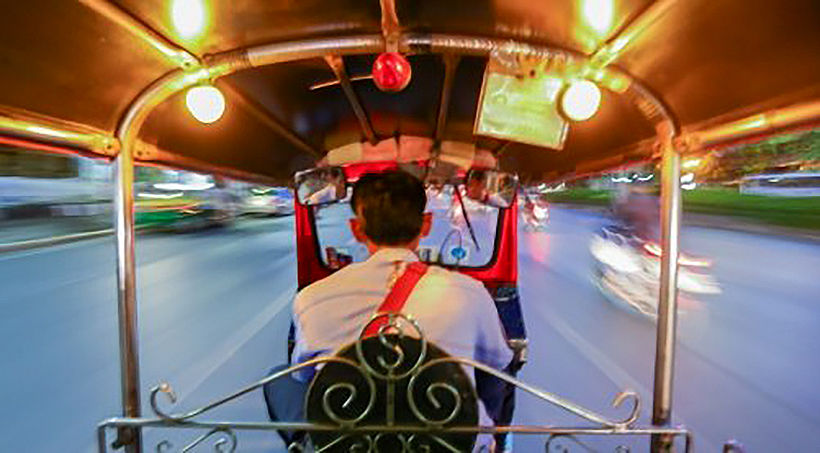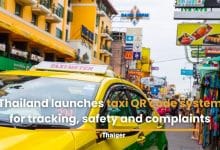The Thai tourism new normal, learning to live with the pandemic

OPINION
by Julian Spindler
Thailand’s world-class tourism industry, one of the twin drivers of our economy, is in a deep, coronavirus-induced coma, close to death.
No life support is currently available. Pandemic paranoia has gripped the nation, freezing our bio-security risk management in full containment mode, meaning zero tolerance for local Covid-19 transmission. The socio-economic, and some might add political, impacts of this crisis are huge. If both direct and indirect contributions are included, tourism represents some 22 percent of GDP, according to Fitch Solutions, and as much as 25 per cent of employment.
The ongoing collapse of this vital pillar of the economy means massive and growing unemployment, potentially amounting to 4-6 million people, a wave of bankruptcies, both among SMEs and larger corporates, and untold misery among our huge informal workforce. These are the millions of food vendors, masseuses, taxi drivers, hotel clerks and, yes, sex workers, who together make up the vibrant and welcoming grassroots human infrastructure that last year attracted 39.8 million visitors, making Thailand the world’s 9th most visited tourist destination and Bangkok the world’s most visited city.
This closed-door public health security policy is not sustainable. According to the Bank of Thailand and international rating agencies there can be no recovery of our economy without a recovery of tourism, and no recovery of tourism without foreign tourists who account for at least 65-70% of the total industry.
To open or not to open, this is question being hotly debated in the Centre for Covid-19 Situation Administration (CCSA), and its newer economic counterpart, the Centre for Economic Situation Administration (CESA), which currently run the country. The outcome to date, the much anticipated Special Tourist Visa (STV), satisfies only the public health voices in the debate. With its 14 day quarantine requirement, many other impractical hoops, and an initial limit of 1,200 foreign visitors per month, the zero tolerance, no local transmission risk profile is being maintained.
If this continues, Thailand’s tourism industry will die.
Let’s be very clear, only a quarantine-free welcome for foreign visitors can deliver the numbers needed to resuscitate the industry. The STV will allow 40 tourists a day to enter the Kingdom; in 2019 daily arrivals averaged nearly 110,000.
How to open safely?
This is the great conundrum facing Thailand and many other countries around the world for whom travel and tourism is a major economic driver.
We cannot wait for vaccines. They stand no chance of eliminating the disease globally. The idea that the only way to eliminate the threat of this disease somewhere is to eliminate it everywhere is simply misleading.
A more realistic solution is to be found in the words of the World Health Organisation’s (WHO) European Director: “The end of the pandemic is the moment that we as a community are going to learn how to live with this pandemic.”
Enter the tourism industry’s new normal: Learning to live with the pandemic.
Learning to live with Covid-19 in Thailand means accepting there might be local transmission, accepting some people might get sick. It means opening our borders again, and quarantine-free entry for foreign tourists, albeit under controlled conditions.
If our Prime Minister has the courage to order the CCSA to make this policy shift, from total containment to managed risk, even as Covid-19 continues to ravage countries around the world, he should understand Thailand will not be alone. Many governments and many components of the international travel and tourism value chain are already rushing to construct the infrastructure necessary to rescue the industry from a global collapse.
For Thailand the first step must be to undo the pandemic paranoia conditioning affecting the whole country so people understand why we have to manage the risks and how we can do this safely, without overwhelming our health care system.
The second step is for all Government agencies and the entire tourism industry value chain to recognise the new normal requires maximum flexibility. For the government bureaucracy this means a dramatic change of mindset, from creating barriers to easing access. For the industry, it means no cancellation fees and full refunds, every step of the traveler’s way.
Keeping this new mindset front and centre, one can identify two types of visitors Thailand can manage for the foreseeable future: Those who are willing to accept and pay for 14-day quarantine, and those who are not.
For the former, the doors should be flung wide open with minimum barriers. Why not? After all this is zero risk for our country.
No restrictions on countries of origin, no pre-paid accommodation requirements and Covid-19 health insurance only for the quarantine period. Digital nomads, snowbirds, returning expatriates, long-stay tourists, businessmen, medical tourists, all should be welcome. The only requirement: A certifiable negative Covid-19 test less than 72 hours prior to flying. Visas-on-arrival for as long as you want should be the order of the day, even year-long-stay visas with a work permit, for a modest sum, say US$1,000.
This new welcoming mindset would generate a small but useful and humane increase in essentially risk-free arrivals so it must be accompanied by a rapid increase in Alternative State Quarantine (ASQ) accommodation throughout the country and in airlift capacity. Simplifying entry requirements would also largely obviate the inter-agency bickering that has bedevilled the STV to date.
Making it even more welcoming, for those who can prove they already have homes here, would be the self-quarantine option, as currently practised in Hong Kong. On arrival, visitors are given another rapid Covid-19 test and if negative, equipped with a GPS tracking wristband and escorted to their registered place of residence, where they remain for 14 days. The tracking devices are monitored to make sure visitors don’t stray.
However, STV arrivals alone will not save our tourism industry; only quarantine-free entry will.
Here’s how it can work, safely:
Enter the much maligned “travel bubble”, quarantine-free travel from countries and areas with low Covid-19 transmission rates to, at first, designated areas in Thailand that aim to be virus free.
Travel bubbles require close, multi-agency cooperation and coordination at both ends. They aim to be bi-lateral, reciprocal agreements. This is why it is so vitally important that our twin Covid-19 nerve centres, and the Cabinet, make a formal decision to open quarantine-free travel in principle as soon as possible, so all the criteria and arrangements can move forward quickly.
Looking at the Thai end of the travel tunnel first, we need to select leading tourist destinations where access can be controlled. Initially that might mean Pattaya, Hua Hin, Phuket, Samui and nearby islands, and Koh Samet.
For these areas the CCSA should instruct the Ministry of Public Health (MOPH) to undertake systematic, large-scale surveillance testing and tracking to cover all residents and migrant workers who are likely to come into contact with tourists. All those tested will be given a health status and tracking app, which will be updated as regular testing continues. Eventually the app will also record vaccination status
Responding to epidemiologists’ war cry that testing, testing and more testing is the key to living safely with the pandemic, large-scale testing would represent a major policy change for the MOPH. To date, Thailand has had a very low rate of testing, even lower than poorer countries like the Philippines and Indonesia. This must change if we are to open travel bubbles safely.
While these preparations are being undertaken for destinations where access is easily controllable, the CCSA and CESA should be working with all relevant agencies to assess the viability of opening additional travel bubbles to other key destinations as quickly as possible.
At the same time Safety and Health Administration (SHA) standard certification must be accelerated to cover virtually all facilities in the travel bubble destinations.
The aim is to reassure foreign visitors of these destinations’ near virus-free status during their stay, a claim which should be underlined by offering free Covid-19 health insurance for the duration of their stay. The CCSA and CESA should also start to develop the new more sustainable tourist ecosystems that meet the public health requirements needed to manage the Covid-19 risks in the longer term.
The next step is deciding which countries, and in some cases like China, which regions or cities, we will link up with.
These decisions must be data-driven, not withstanding diplomatic preferences, so as to allow a high degree of automaticity. As Covid-19 infection rates change around the world so will our allowable travel bubbles.
To manage epidemiological risk, the criteria and thresholds for identifying our travel bubble partners must be clearly defined. Thailand could adopt an approach similar to that being developed for the EU where the travel and tourism sector is screaming for harmonised travel regulations.
Published two months ago, the industry’s European Tourism Manifesto urges the EU to replace the need for quarantine with comprehensive, cost-effective testing and tracing, to avoid blanket restrictions by using more granulated data to better target specific areas, to not impose restrictions on passengers in transit, and to ensure the interoperability of contact tracing apps.
For Thailand to consider, the current European Commission criteria and thresholds dictate countries should not restrict travel from other countries with fewer than 25 new cases per 100,000 people over the previous 14 days, and a test positivity rate of less than three per cent provided the weekly testing rate exceeds 250 tests per 100,000 people. There are other criteria that could be considered, and thresholds can be adjusted, but this will be for Thailand’s epidemiologists to decide, once the political decision to open our borders for quarantine-free travel has been made.
Now that we have the tools to select, on a risk-managed basis, our travel bubble partners, we need to accurately monitor the health status of the individual tourists from these countries.
One possible tool is already a work-in-progress with at least 40 countries collaborating to launch Common Pass, a standard global framework enabling people to document and present their Covid-19 status, in a way that participating governments can verify, to facilitate safe border crossings while protecting individual data privacy, in effect a Covid-19 passport.
Common Pass, currently being tested internally on flights between London and New York, and Hong Kong and Singapore, is being developed by The Commons Project, a Swiss not-for-profit, in partnership with the World Economic Forum.
Common Pass aims to answer four questions that are vital for managing epidemiological risk with quarantine-free travel when our only protection is a very recent negative Covid-19 test. These are…
• How can a lab test result or vaccination record from another country be trusted?
• Is the lab or vaccination facility accredited?
• How do we confirm the person who took the test, or received the vaccination, is indeed the person who is traveling?
• Does the traveler meet border entry requirements?
Thailand is not currently participating in Common Pass. We should be. Each participating country needs to decide two things: Which centres for Covid-19 tests, and vaccinations, are deemed credible in their country, and their own border entry requirements. After the individual foreign traveler inputs their test results, the app will do the rest and when presented to airlines or border controls will show if the bearer is fit to enter.
Common Pass expects to become fully operational in early 2021. Until then, with no standard certifiable system for Covid-19 tests in place, we might decide to deploy the rapid 15-minute antigen tests that are coming onto the market at our airports as additional protection against less than reliable foreign test results.
Meanwhile, our multi-agency Tourism Recovery Team should be very busy negotiating travel bubbles with individual countries that currently meet our epidemiological criteria for quarantine-free entry. Given bureaucratic inertia, this will be a time consuming exercise but it is the only path to tourism survival.
We have already engaged with China for the STV. Now, we would do well to open discussions with Singapore, and learn from Singapore, as it has ASEAN’s most proactive policies for reopening international travel, including quarantine-free entry for travellers from Brunei and New Zealand since September 1. With hard work and goodwill on both sides we could hope to see Singaporean tourists arriving before the end of the year.
When Covid-19 started to spread across an unprepared world early this year, Bangkok and Thailand both ranked number one in terms of anticipated impact severity. The first case of the virus outside China was recorded here, and during the first three months, before the lockdown, nearly three million Chinese tourists visited. But our world-class public health security system, ranked sixth in the world prior to the pandemic, and the willingness of the Thai people to put community first, enabled us to manage the potential disaster to the point where today Thailand is regarded as an outstanding example of successful pandemic management.
We have now had six months to further strengthen our public health capacities across the board. It is time for the government to leverage this world-class public health security ecosystem and save our world-class tourism industry and the many millions of citizens who depend on it.
Julian Spindler is a strategic communications consultant and long-time resident of Thailand. Since arriving in Thailand in 1969, Julian has worked as a journalist, editor, publisher and strategic communications consultant. Today he specialises in sustainability issues, crisis communications and strategic planning.
Latest Thailand News
Follow The Thaiger on Google News:


























